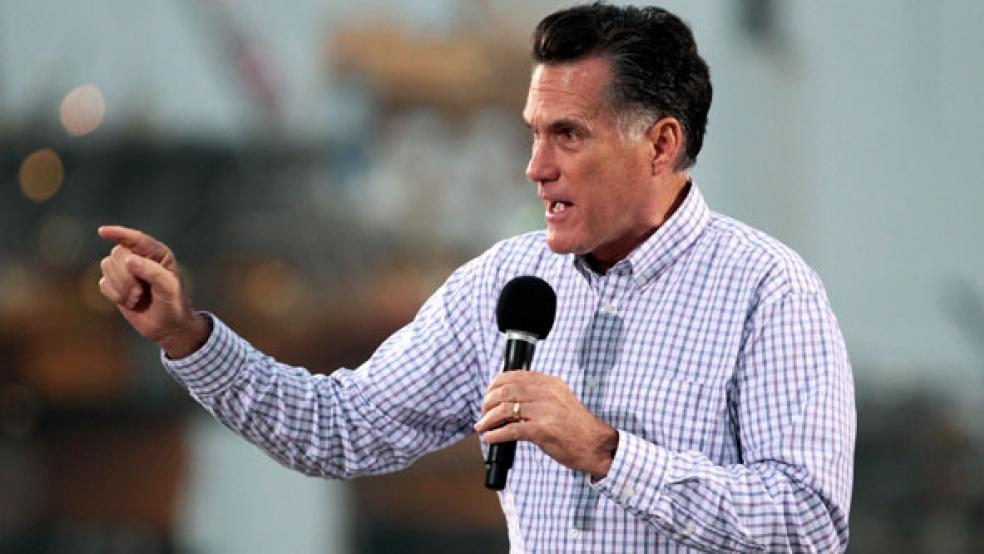It’s time for Republicans to stop mewing like sick kittens and get on with ejecting President Obama from the White House. Like Victorian mothers fussing over their daughters, pundits on the right can’t stop nattering over frontrunner Mitt Romney’s flaws. He has not yet won over a clear-cut majority of GOP voters, he will preside over a divided party, his unfavorables are too high, he’s gaffe-prone, he carries some baggage – most notably Romneycare.

These are concerns that, in many cases, also dogged Ronald Reagan during primary season in 1980. Mr. Reagan, too, was expected to lose; he, too, was under attack from different factions in the Republican Party, he polled at a disadvantage to the incumbent, he made some unfortunate ethnic jokes, he was pilloried for his record as a tax-raiser.
It didn’t matter. Once nominated, Reagan went after President Carter, who was vulnerable. This year, Mitt Romney (the most likely nominee) will go after President Obama, who is also vulnerable. A candidate whose campaign theme is, “I can’t get anything done!” and who continues to blame his predecessor for every misfortune doesn’t have much to sell.
How should the GOP campaign unfold? Mr. Romney’s overarching theme should be the basic difference between the left and the right: Democrats want to control or influence an ever-larger slice of our nation’s commerce. They want to oversee, for instance, the insurance companies, drug producers, hospitals, banks, coal miners, oil producers, pipeline operators and auto suppliers. By way of ramped-up regulation, subsidies and energized litigators, they seek to impose their priorities on businesses large and small – their rapture over green energy, their deference to organized labor, their indifference to profits.
Mr. Romney’s retort: the government is not good at commerce. If bureaucrats could run the economy, the Soviet Union would have survived. This is a winning message. Polling done by the Gallup organization last fall revealed that 64 percent of Americans consider “Big Government” the greatest threat to the country -- much more than big business or big labor. Skepticism over the role of the federal government is profound; Americans estimate that 51 cents of every dollar spent by the government is wasted. Perhaps even more surprising is a poll also conducted last fall that showed Americans twice as ready to blame the federal government than Wall Street for our economic woes. Imagine -- after the biggest financial crash in decades.
These are startling positions, and excellent fodder for Republicans. Romney will have at his disposal several examples of federal foolishness ready-made for a campaign. He can start with energy. The disappointing but heavily subsidized Chevy Volt is the kind of symbol campaigns beg for; the failed Solyndra is another. The Obama administration’s commitment to alternative energy at any cost – a pursuit that will inevitably drive up costs for companies and individuals – can be exploited. If, in November, gasoline prices are still higher than normal, the public will be open to charges that Mr. Obama’s energy policy is responsible.
Even if gasoline prices revert to more normal levels, Republicans can bang away on the foolhardy Keystone decision, the early-term slowdown in the leasing of federal lands, the EPA’s steroidal mandates for power companies. With U.S. energy reserves soaring, Americans will not buy the notion that fossil fuels have no future – nor should they.
Another weapon at Mr. Romney’s disposal will be Obamacare. A firm majority of the country (53 percent in a Rasmussen poll) continues to support repeal of the controversial bill. As much as Americans dislike the federal government’s interference in the workplace, they especially don’t like Uncle Sam reaching into their homes. As those on the left have pointed out, this is inconsistent with the rising number of Americans who receive services from the government, and most especially Medicare.
Still, many object to the notion that an independent advisory group appointed by the White House will have considerable sway over future Medicare reimbursement rates. Most important, while the bill was sold as a way of reining in the growth in healthcare expenditures, it is clear the law will have no such impact. Otherwise, why are we still arguing over plans to reform Medicare?
Romney has already laid out a reasonable defense of the bill he adopted while Governor of Massachusetts. He portrays Obamacare as an attempt to conclude a “government takeover of health care,” while his program was focused on helping people obtain health insurance. He has noted that his health care bill raised no new taxes and cut nothing from seniors’ benefits; Obamacare does both. As we race closer to the huge tax increases Obamacare will levy in 2013 and 2014, this is a powerful distinction.
Meanwhile, the jobs picture has improved, but only from tragic levels. The rate of hiring is way below normal for a recovery; the GOP can reasonably criticize President Obama for having abandoned the job push too early, focusing instead on healthcare. They can also point to our soaring national debt – borrowings that now preclude us from undertaking the kind of infrastructure spending that most Americans would welcome and that might provide jobs.
President Obama has been campaigning like a demon, only to see his approval ratings sink in inverse relation to gasoline prices. Perhaps this is the most startling realization for the GOP; Mr. Obama turns out not to be the incandescent orator people thought him to be. Those Victorian mothers should calm down; Romney can win this race.






